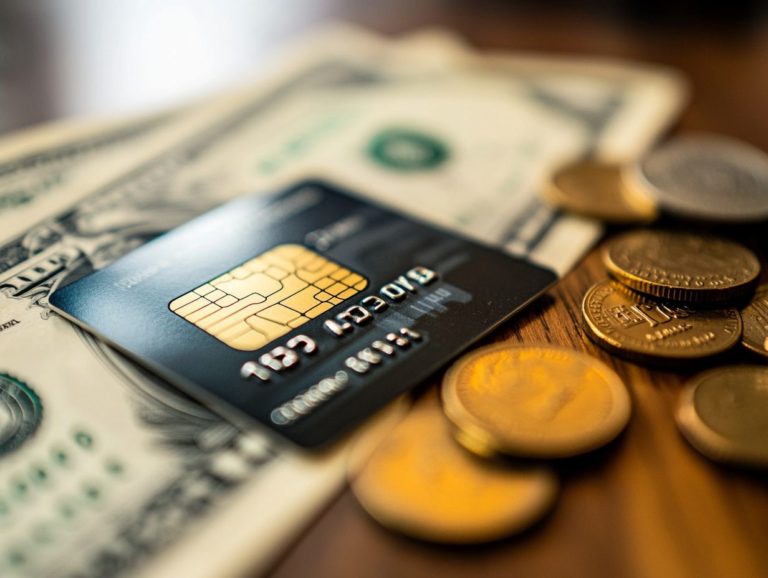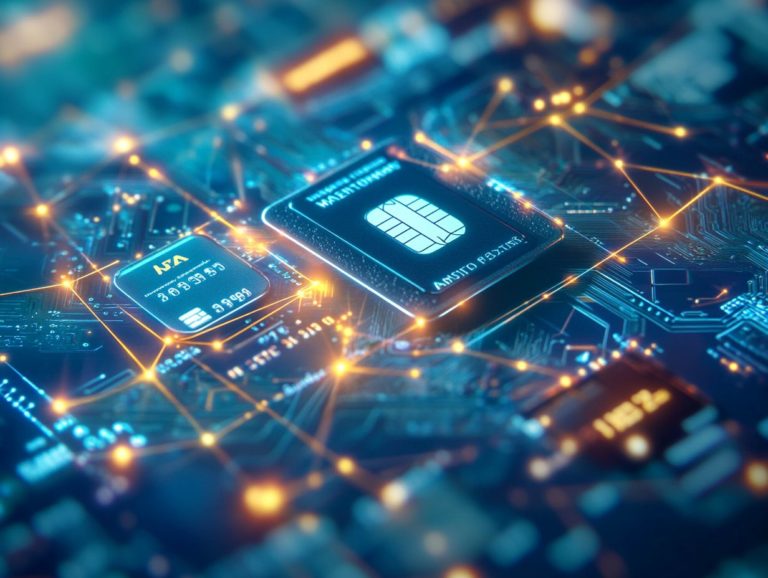What Are the Best Practices for Credit Card Use?
Navigating the world of credit cards may feel overwhelming, but understanding how they work and using them responsibly can open doors to numerous benefits.
From building your credit and reaping rewards to identifying pitfalls, this article serves as your comprehensive guide to credit card management essentials.
Uncover best practices for budgeting and payment strategies that empower you to maximize rewards while avoiding common missteps.
Get ready to master your credit card experience and unlock its full potential!
Contents
- Key Takeaways:
- Understanding Credit Cards
- Benefits of Responsible Credit Card Use
- Common Credit Card Mistakes to Avoid
- Best Practices for Managing Credit Cards
- Maximizing Credit Card Benefits
- Frequently Asked Questions
- What Are the Best Practices for Credit Card Use?
- Why is it important to pay off your credit card balance in full each month?
- How can I keep track of my credit card spending?
- Are there any benefits to using a credit card for purchases?
- What should I do if I can’t pay off my credit card balance in full each month?
- What are some red flags to watch out for when using a credit card?
Key Takeaways:

- Be aware of how credit cards work and the benefits they offer, such as building credit and earning rewards.
- Avoid common mistakes like overspending and accumulating debt by managing your credit cards responsibly through budgeting and strategic payments.
- Maximize the benefits of your credit cards by utilizing rewards and avoiding unnecessary fees.
Understanding Credit Cards
Understanding credit cards is vital for anyone aiming to navigate their money situation with confidence. These important financial tools do more than just facilitate purchases; they help in building credit and managing your financial needs.
With a range of features, including varying interest rates and credit limits, credit cards can significantly impact your overall financial health. Using your card responsibly can enhance your FICO score, while mismanagement may lead to credit card debt and late payments.
Whether you choose secured cards or student cards, understanding how they work is essential for maintaining a strong payment history.
What are Credit Cards and How do They Work?
Credit cards are powerful financial tools that allow you to borrow funds from your issuer for purchases, under the agreement to repay the borrowed amount along with any interest that may accrue. Each card has features such as cash back rewards, balance transfers, and varying APRs, which stands for Annual Percentage Rates, reflecting your creditworthiness and payment history.
Understanding how these mechanisms operate is essential for anyone aiming to manage their finances wisely. Payments are generally due on a monthly basis, and missing a due date can result in hefty interest charges and potential fees that can add up quickly. Late payments can damage your credit score, making it crucial to pay on time.
It s also important to understand the concept of statement balance, which indicates the amount due during the billing cycle. This figure directly influences your credit utilization a key component in credit scoring that can affect your future borrowing options.
Benefits of Responsible Credit Card Use
The advantages of responsible credit card use extend beyond simply making purchases. They encompass building credit, earning valuable rewards, and enhancing your payment history.
By using credit cards wisely, you can manage your spending habits, align them with your current financial goals, and unlock a wealth of rewards like cash back and travel perks. These benefits can greatly enhance your financial portfolio and help you achieve your aspirations.
Building Credit and Earning Rewards

Building credit while earning rewards is one of the most compelling benefits of using credit cards wisely. By using your card responsibly, you can boost your credit score, unlock favorable interest rates, and increase your credit limits over time, all while enjoying various rewards programs like cash back and travel perks.
Timely payments and keeping your credit utilization below 30% are key strategies for establishing a strong credit profile. It s crucial to check your statements for any discrepancies and take advantage of free credit reports to stay informed about your standing.
When comparing different credit card options, look for cards that offer the best rewards as well as those with lower annual fees or attractive promotional offers. These insights can significantly enhance both your rewards and savings, making your financial journey even more rewarding.
Now that you know the essentials of credit card management, consider applying what you ve learned to your own habits. Start making informed decisions today!
Common Credit Card Mistakes to Avoid
Avoiding common credit card mistakes is crucial for maintaining your financial integrity. Many cardholders unknowingly fall into traps like accumulating credit card debt, missing payment due dates, and racking up excessive interest charges. Stay alert to these pitfalls to protect your finances!
By being vigilant and implementing payment reminders, you can navigate your credit card usage with confidence. This will help keep your credit profile healthy and steer clear of those detrimental inquiries that could affect your standing.
Debt Accumulation and Overspending
Debt accumulation and overspending are major challenges for many credit card users. These issues often lead to long-term financial consequences. It s essential to recognize how your spending habits can spiral out of control, resulting in credit card debt that negatively affects your payment history and credit scores.
Factors contributing to these issues include spending more as your income grows, impulsive purchases, and insufficient budgeting. If you’re looking to regain control over your finances, establishing a balanced budget is a crucial first step.
By diligently tracking your monthly expenses and setting clear spending limits, you can effectively curb overspending tendencies. Understanding credit utilization how much credit you re using compared to your total available credit is also vital. Keeping your usage below 30% can help maintain a healthy credit score and pave the way for a more sustainable financial future.
Best Practices for Managing Credit Cards
Implementing best practices for managing credit cards is crucial for your financial well-being. By adopting effective budgeting techniques and strategic payment methods, you can align your spending with your current financial needs while reaping the full benefits of your credit cards.
Utilizing tools like Autopay ensures timely payments and keeps pesky late fees at bay. This allows you to manage your credit limit with confidence.
Budgeting and Payment Strategies

Effective budgeting and strategic payment methods are essential for responsible credit card management. By diligently monitoring your outstanding balances and setting up payment reminders, you can ensure that you make at least the minimum payments on time.
This proactive approach helps you dodge late fees and safeguards your credit score. Beyond simply meeting minimum payment requirements, crafting a comprehensive budgeting plan that includes credit card spending limits is vital for your financial health.
This involves tracking your monthly expenses and understanding how credit utilization ratios work. Keeping your balances low in relation to your credit limits plays a significant role in influencing your credit score.
Timely payments not only prevent penalties but also contribute to a positive credit history. This is crucial for your future borrowing opportunities. Establishing specific payment strategies, such as the snowball or avalanche method, can enhance your ability to manage multiple cards effectively and improve your overall financial well-being.
Maximizing Credit Card Benefits
Unlock your credit card benefits by taking a strategic approach that focuses on leveraging rewards while avoiding hidden fees. As a discerning cardholder, capitalize on travel rewards, cash back opportunities, and promotional periods to enhance your financial portfolio.
By doing so, you minimize unnecessary costs tied to your credit cards and unlock the true potential of your spending power!
Start implementing these strategies today to take control of your credit card usage!
Using Rewards and Avoiding Fees
Using rewards effectively is key to optimizing your credit cards. Avoiding fees enhances these benefits.
Get to know your credit card issuer’s offerings to unlock amazing rewards! Understanding the array of fees associated with rewards programs is equally vital. Many cardholders tend to overlook the fine print, which can lead to unwelcome surprises like annual fees or specific conditions tied to promotional offers.
By thoroughly reviewing the terms and conditions, you can pinpoint the best strategies to utilize your rewards. Staying informed about expiration dates and redemption options will empower you to make the most of your points or cash back, ensuring nothing goes to waste.
This approach amplifies your benefits and cultivates smart financial habits, transforming your rewards experience into something both enjoyable and valuable.
Frequently Asked Questions
Here are some common questions about credit card usage and rewards.
What Are the Best Practices for Credit Card Use?

The best practices for credit card use include paying off your balance in full each month, keeping track of your spending, and only using your card for necessary expenses.
Why is it important to pay off your credit card balance in full each month?
Paying off your balance in full helps you avoid interest charges, which can add up quickly and make your purchases more expensive in the long run.
How can I keep track of my credit card spending?
You can keep track of your credit card spending by regularly checking your account balance, monitoring transactions, setting spending limits, and using budgeting tools to stay within your budget.
Are there any benefits to using a credit card for purchases?
Yes, using a credit card for purchases can offer benefits such as cashback rewards, purchase protection, and the ability to build credit when used responsibly.
What should I do if I can’t pay off my credit card balance in full each month?
If you can’t pay off your balance in full, it’s important to at least make the minimum payment on time to avoid late fees and damage to your credit score. You can also reach out to your credit card issuer for potential payment arrangements.
What are some red flags to watch out for when using a credit card?
Red flags to watch out for when using a credit card include high interest rates, hidden fees, and overspending beyond your means. It’s important to read your credit card agreement carefully and ensure you understand all the terms and conditions.






